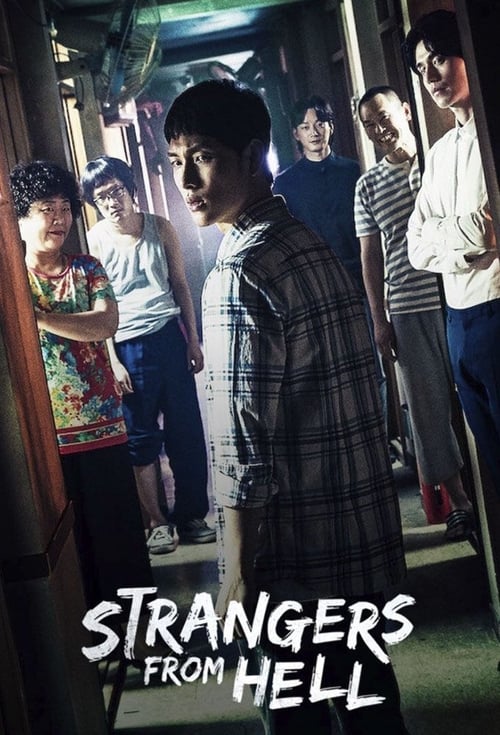
Ask Your Own Question
What is the plot?
The episode begins with a flashback to 2000, where a young girl named Jin Seon-woo is seen playing with her friends. The scene shifts to the present day, where Detective Park Hae-young is investigating a cold case involving the murder of a young girl. He is haunted by the memories of his own past and the unsolved cases that linger in his mind. Hae-young receives a call from the past through a walkie-talkie, connecting him to Detective Lee Jae-han, who is in 2000.
Hae-young and Jae-han discuss the case of the young girl, and Hae-young learns that the girl's name is Jin Seon-woo. Jae-han is determined to prevent her murder, and Hae-young is motivated to help him. They begin to piece together clues from the past, trying to identify the potential suspect. Hae-young feels a sense of urgency, knowing that their actions could alter the present.
As they investigate, Hae-young discovers that Seon-woo's mother is a key figure in the case. He urges Jae-han to protect her and to keep an eye on the girl. Jae-han, feeling the weight of responsibility, promises to do everything he can to save her. The two detectives work together, sharing information and strategizing on how to intervene without causing a ripple effect in the timeline.
Meanwhile, in the present, Hae-young's partner, Detective Kim Hye-soo, becomes suspicious of his late-night activities. She confronts him about his obsession with the cold case and his connection to Jae-han. Hae-young struggles to explain the situation without revealing the truth about the walkie-talkie and the time connection. Hye-soo's concern for Hae-young grows, as she senses that he is emotionally invested in the case.
Back in 2000, Jae-han follows a lead that takes him to a suspect, a man with a history of violence. He confronts the man, but the encounter escalates into a physical confrontation. Jae-han manages to subdue the suspect, but not without sustaining injuries. He realizes that time is running out to save Seon-woo, and he must act quickly.
Hae-young, still in contact with Jae-han, learns about the confrontation and urges him to be careful. He feels a deep connection to Seon-woo and is increasingly anxious about the potential consequences of their actions. Hae-young begins to question whether they can truly change the past without causing unforeseen problems in the present.
As the episode progresses, Jae-han discovers that Seon-woo's mother is planning to take her to a festival, which could put her in danger. He races against time to warn her, but when he arrives, he finds that the mother is already in a precarious situation. Jae-han intervenes just in time to prevent a kidnapping attempt, showcasing his determination to protect Seon-woo.
In the present, Hae-young receives news that the case has been reopened due to new evidence. He realizes that their actions in the past have altered the present, but he is unsure of the full implications. Hye-soo continues to support him, but she remains unaware of the supernatural elements at play.
The episode culminates in a tense moment where Jae-han successfully saves Seon-woo, but the victory is bittersweet. He is left with the knowledge that changing the past has consequences, and he must grapple with the emotional weight of his actions. Hae-young, reflecting on the events, understands that while they may have saved a life, the future remains uncertain.
The episode ends with both detectives feeling the impact of their choices, as they continue to navigate the complexities of time and the burden of their responsibilities.
What is the ending?
In the ending of "Signal," Season 1, Episode 5, titled "Changing the Past Alters the Present," the characters grapple with the consequences of their actions as they attempt to prevent a series of murders. The episode culminates in a tense confrontation that leads to significant changes in the timeline, affecting the fates of the main characters.
As the episode unfolds, we see the characters struggling with the implications of their time-traveling communication. Lee Jae-han, the detective from the past, and Park Hae-young, the present-day profiler, work together to stop a serial killer. Their efforts lead to a critical moment where they realize that altering the past has unforeseen consequences on their present lives.
In the final scenes, Jae-han's actions to save a victim lead to a tragic outcome, as he faces the repercussions of his choices. Hae-young, deeply affected by the changes in the timeline, must confront the reality of their situation. The episode ends with a sense of unresolved tension, leaving the characters to deal with the emotional fallout of their attempts to change fate.
Now, let's delve into the ending in a more detailed, chronological narrative.
The episode builds towards its climax as Lee Jae-han, the detective from 2000, and Park Hae-young, the profiler from 2015, continue their collaboration through the walkie-talkie that connects their timelines. They are determined to stop a serial killer who has been terrorizing the city. As they gather information, they realize that their actions in the past can significantly alter the present.
In a pivotal scene, Hae-young discovers that a young girl is in imminent danger. He relays this information to Jae-han, who is racing against time to intervene. The tension escalates as Jae-han rushes to the location where the girl is supposed to be, hoping to save her from the killer. The urgency of the moment is palpable, with Jae-han's heart pounding as he navigates through the streets, fueled by the desire to protect the innocent.
However, as Jae-han intervenes, he inadvertently alters the course of events. The killer is thwarted, but the ripple effects of this change become apparent almost immediately. Hae-young, who is monitoring the situation from the present, begins to notice discrepancies in his reality. People he knows start to disappear from his life, and he feels a growing sense of dread as he realizes that their attempts to save lives are leading to unforeseen consequences.
In a heart-wrenching moment, Jae-han confronts the killer, and a struggle ensues. The scene is fraught with tension as Jae-han fights not only for the girl's life but also for the integrity of the timeline. The emotional stakes are high, and Jae-han's determination is evident as he recalls the lives that have been lost due to the killer's actions.
As the confrontation reaches its peak, Jae-han manages to save the girl, but the victory is bittersweet. The timeline shifts dramatically, and Hae-young is left grappling with the reality that his actions have led to the loss of people he cares about. The emotional weight of their choices hangs heavily in the air, and both characters are left to ponder the moral implications of their interference.
The episode concludes with a somber tone. Jae-han, having saved the girl, is left with the knowledge that his actions have altered the lives of many, including his own. Hae-young, now facing a changed present, is filled with regret and uncertainty about the future. The final moments leave viewers with a sense of unresolved tension, as the characters must navigate the consequences of their attempts to change the past.
In summary, the fates of the main characters are intertwined with the choices they make. Jae-han's heroic actions lead to a bittersweet victory, while Hae-young is left to confront the emotional fallout of their time-altering decisions. The episode closes with a haunting reminder of the complexities of fate and the impact of their choices on the lives of others.
Is there a post-credit scene?
In "Changing the Past Alters the Present," the fifth episode of Signal, there is no post-credit scene. The episode concludes without any additional scenes or content after the credits roll. The focus remains on the main narrative and character developments throughout the episode, leaving no extra material for viewers to engage with after the main story has ended.
How does the communication between Park Hae-young and Lee Jae-han evolve in this episode?
Throughout the episode, Park Hae-young and Lee Jae-han's communication deepens as they work together to solve the case. Hae-young becomes more reliant on Jae-han's insights from the past, leading to a stronger bond and a sense of urgency as they realize the consequences of their actions.
What significant event does the team investigate in this episode?
In this episode, the team investigates a case involving a murder that took place in the past, specifically focusing on the death of a young girl named Lee Jin-sook. The investigation reveals connections to a series of other crimes and the impact of their actions on the present.
What internal conflict does Detective Cha Soo-hyun face in this episode?
Detective Cha Soo-hyun grapples with her feelings of guilt and frustration as she uncovers the truth about the past. She is torn between her duty to solve the case and the emotional weight of the lives affected by the events they are trying to change.
What are the consequences of changing the past as depicted in this episode?
The episode illustrates the ripple effects of altering past events, showcasing how small changes can lead to significant and often tragic outcomes in the present. The characters experience firsthand the emotional turmoil and unexpected consequences of their attempts to prevent the original crime.
How does the episode explore the theme of regret through its characters?
Regret is a central theme in this episode, particularly through the character of Park Hae-young, who reflects on his past decisions and their impact on his life and the lives of others. The emotional weight of regret drives the narrative, influencing the characters' motivations and actions as they confront their past.
Is this family friendly?
In "Changing the Past Alters the Present," episode 5 of Signal, there are several elements that may be considered objectionable or upsetting for children or sensitive viewers:
-
Violence: The episode includes scenes depicting crime and violence, which may be intense or distressing for younger audiences.
-
Murder Investigation: The central plot revolves around a murder case, featuring discussions and depictions of death, which can be unsettling.
-
Emotional Turmoil: Characters experience significant emotional distress, including grief and anxiety, which may resonate deeply with sensitive viewers.
-
Dark Themes: The exploration of altering the past and its consequences introduces themes of regret and loss, which may be heavy for younger viewers to process.
-
Tense Situations: There are moments of suspense and tension that could be frightening, particularly for children.
These aspects contribute to a more mature viewing experience, and parental discretion is advised.































